University students in Dhaka and other cities have been holding rallies for days against the system of reserving some public sector jobs for the relatives of war heroes
PTI Dhaka
Published 18.07.24
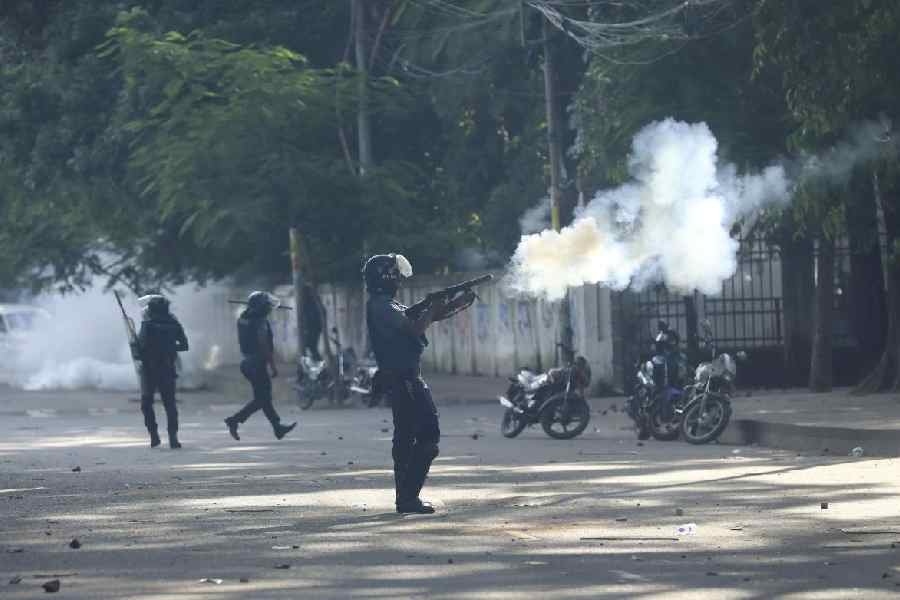
Police fire tear gas shells and rubber bullets to disperse students shouting slogans in favor of quota system in public service at the university campus, in Dhaka, Bangladesh, Wednesday, July 17, 2024.AP/PTI
At least 18 more people were killed and over 2,500 injured in Bangladesh on Thursday, media reports said, as violence escalated in the capital Dhaka and elsewhere over student protests demanding quota system reform for government jobs, taking the toll to 25 since the protests erupted.
Witnesses said the protesters laid a siege on the state-run Bangladesh Television Bhaban in the Rampura area in Dhaka and damaged its front side, torched several parked vehicles while some staff including journalists were trapped inside.
University students in Dhaka and other cities have been holding rallies for more than a week protesting the system of reservation in public sector jobs, including that for the relatives of war heroes, who fought for the country's independence from Pakistan in 1971.
“At least 18 people were killed and more than 2,500 were injured in today's nationwide clashes between protesters and law enforcers and ruling party men,” newspaper The Daily Star said.
Earlier, the mass-circulation Prothom Alo newspaper had reported, “There are reports of 11 deaths. While nine of these deaths are reported from Dhaka, one is in Savar, on the outskirts of the capital, and one in south-western Madaripur district.” Private Somoy Television channel said police continued to use rubber bullets, tear gas and sound grenades to disperse the protesters.
The major clashes between protesters and police erupted in the Uttara area of the capital where several private universities are located.
Authorities could not immediately confirm the identity of all but reports suggest most of the dead are assumed to be students.
Earlier, six people, most of them students, were killed on Tuesday while another death was reported overnight, taking the total death toll to 18 since the protest started more than a week ago.
However, police have not yet issued a statement on the casualties.
The escalated violence prompted authorities to shut the metro rail inside the capital alongside the railway services to and from Dhaka since Thursday afternoon.
The government ordered the shutdown of mobile internet networks to quell the demonstrators. Bangladesh police website was inaccessible while that of the ruling Awami League’s student wing Bangladesh Chhatra League was hacked.
Authorities deployed Border Guard Bangladesh personnel across the country including the capital, to maintain law and order, the official BSS news agency reported.
Government offices and banks were open as paramilitary Border Guard Bangladesh (BGB), riot police and elite anti-crime Rapid Action Battalion (RAB) patrolled streets in Dhaka and other major cities but the attendance appeared thin because of limited public transport. Also, many offices have asked their staff to work from home.
The protesters overnight vowed to enforce a “complete shutdown” nationwide after days of their demonstrations and violent clashes and ruling Awami League-backed student activists that left at least seven people dead on Tuesday.
Earlier reports suggested that Thursday’s violence escalated after the ruling party’s student activists allegedly confronted the protesters on the streets with bricks and bamboo sticks.
Law minister Anisul Huq, meanwhile, told a media briefing on Thursday that the government decided to sit in a dialogue with protesting students and that Prime Minister Sheikh Hasina had entrusted him and Education Minister Mohibul Hassan Chowdhury with the task of the discussion.
The law minister said, as promised by the prime minister on Wednesday, a judicial investigation committee was formed on Thursday with High Court judge Khondkar Diliruzzaman as its head to enquire into the killing in violence. He also urged them to call off the protest.
But Students Against Discrimination, the main group behind this month's rallies, said the premier’s words were insincere and “it did not reflect the murders and mayhem carried out by her party activists.” A spokesman of the protesters later said they no longer seek dialogue with the government and Nazmul Hassan, one of the coordinators said: “Instead, we demand the immediate issuance of a gazette notification cancelling quotas in government jobs.” Fifty-six per cent of government jobs are reserved under the current quota system. A maximum 30 per cent is for the descendants of the 1971 Liberation War freedom fighters, 10 per cent for backward administrative districts, 10 per cent for women, five per cent for ethnic minority groups and one per cent for physically challenged people.
Every year some 3,000 government jobs open up to nearly 4,00,000 graduates.
The protestors are waging a campaign for the reform of the system saying it debars meritorious students’ recruitment in first-class and second-class government jobs.
Earlier on Wednesday, Hasina, in a televised address, had offered an olive branch asking protesters to keep patience and faith in the Supreme Court as the issue is pending there for a decision. “I believe our students will get justice (in the apex court). They will not be disappointed,” she said.
The Supreme Court has set August 7 as the date for the hearing of the case. The law minister said the government would file a petition to advance the date for quicker disposal of the issue.
Bangladesh state TV set ablaze in deadly protests
By Flora Drury and Anbarasan Ethirajan, BBC News, TODAY
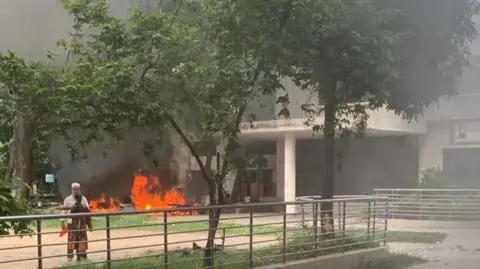
Protesters set fire to the headquarters of the state broadcaster in Bangladesh on Thursday as violent clashes between students and police continued, the authorities said.
It comes as the country was reported to be in the midst of a near total internet blackout.
A post on BTV's official Facebook page warned "many" were trapped inside the building in Dhaka, as it appealed for help from the fire service to put the blaze out.
Bangladesh's information minister told the BBC that broadcasts had been stopped and most employees had left the building in the capital.
Prime Minister Sheikh Hasina had appeared on the network the night before, appealing for calm after days of violent protests which have left at least 17 people dead, possibly many more, and hundreds injured.
Students have been holding rallies demanding change to a system which reserves a third of public sector jobs for the relatives of veterans of the country’s war for independence from Pakistan in 1971.
The students are arguing that the system is discriminatory, asking for recruitment based on merit.
The government has been trying to quell the protests, on Thursday switching off the country's mobile internet in an attempt to slow the students.
Instead, it became the deadliest day so far, according to news agency AFP. According to its count citing hospitals, a total of 32 people have died during the protests - most of them on Thursday.
The BBC's Bengali service has confirmed 17 deaths so far - among them, a 32-year-old journalist for the Dhaka Times.
Sheikh Hasina had condemned protesters' deaths as "murder" in her Wednesday television appearance, but her words were largely dismissed by protest organisers.
Thursday saw tear gas and rubber bullets deployed by officers, as students created human blockades in the streets.
The students who stormed BTV had earlier "torched" a police station, according to an official at BTV.
"They chased the police officers when they took refuge at the BTV office," the official told AFP. "Angry protesters then caused mayhem here."
The Bangladeshi information minister Mohammad Ali Arafat told the BBC that the employees still inside the building were "feeling very unsafe".
"They [protesters] went in and vandalised," he said.
"Security forces are there fully but... they were present physically, they were not trying to put any counter attack.
"But they'll be doing it now, they will warn everyone and then they will go full on to clear it up."
Four more people die in fresh clashes between police and anti-quota protesters
Alisha Rahaman Sarkar
Ten dead in Bangladesh as anti-quota students clash with police
India asked its citizens in Bangladesh to avoid local travel as police clashed with anti-reservation protesters amidst a call for a nationwide shutdown following the death of at least 10 people.
Hundreds of people have sustained injuries in the weeks-long protests which turned violent this week following clashes and incidents of arson that led to the death of at least three students among other victims.
People in the South Asian country stayed home on Thursday as few shops and offices opened for business in the capital Dhaka. The call for the national shutdown by students, demanding the abolition of 30 per cent reservation in government jobs, drew limited response.
The Indian embassy, in an advisory to its citizens currently living or visiting Bangladesh, asked them to “avoid local travel and minimise their movement outside their living premises”.
Thousands of students have called on the Sheikh Hasina government to abolish the reservation in government jobs for family members of freedom fighters from the 1971 War of Independence. The quota system also reserves jobs for women, disabled people, and ethnic minority groups.
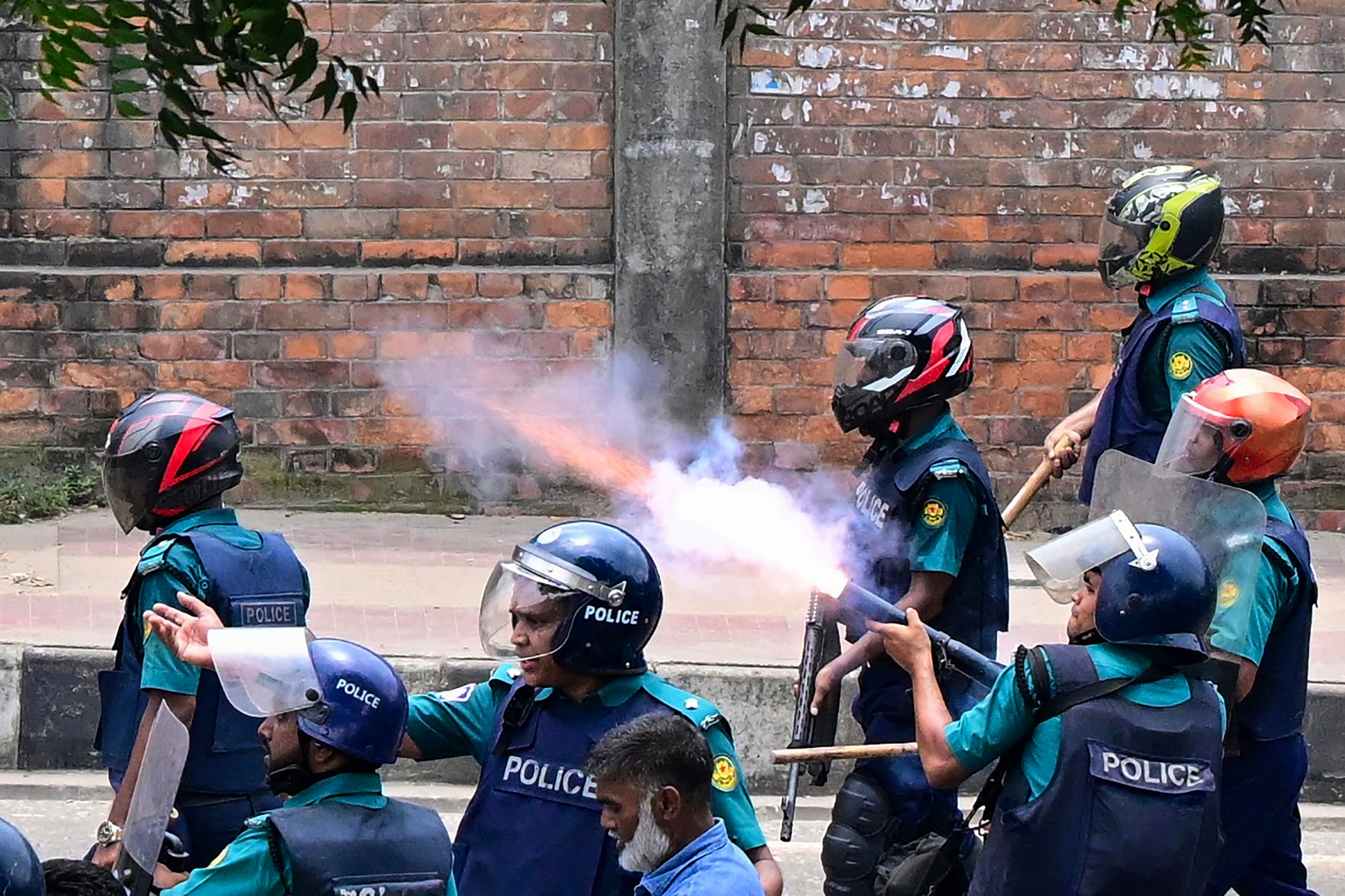
Four people died in the clashes with police in Dhaka on Thursday as hundreds more suffered injures, according to local reports.
Police fired tear gas to scatter stone-throwing protesters as the students showed no sign of slowing the agitation. Sporadic clashes were reported in several places as demonstrators blocked major highways. Witnesses said the riot police fought pitched battles with protesters in several places in Dhaka.
Law enforcement authorities have used "unlawful force" against students during the ongoing ‘Bangla-Blockade’ protest, rights group Amnesty International said, citing witnesses and video evidence. Abu Sayed, a 25-year-old university student, was found dead with bullet wounds in the north-western city of Rangpur.
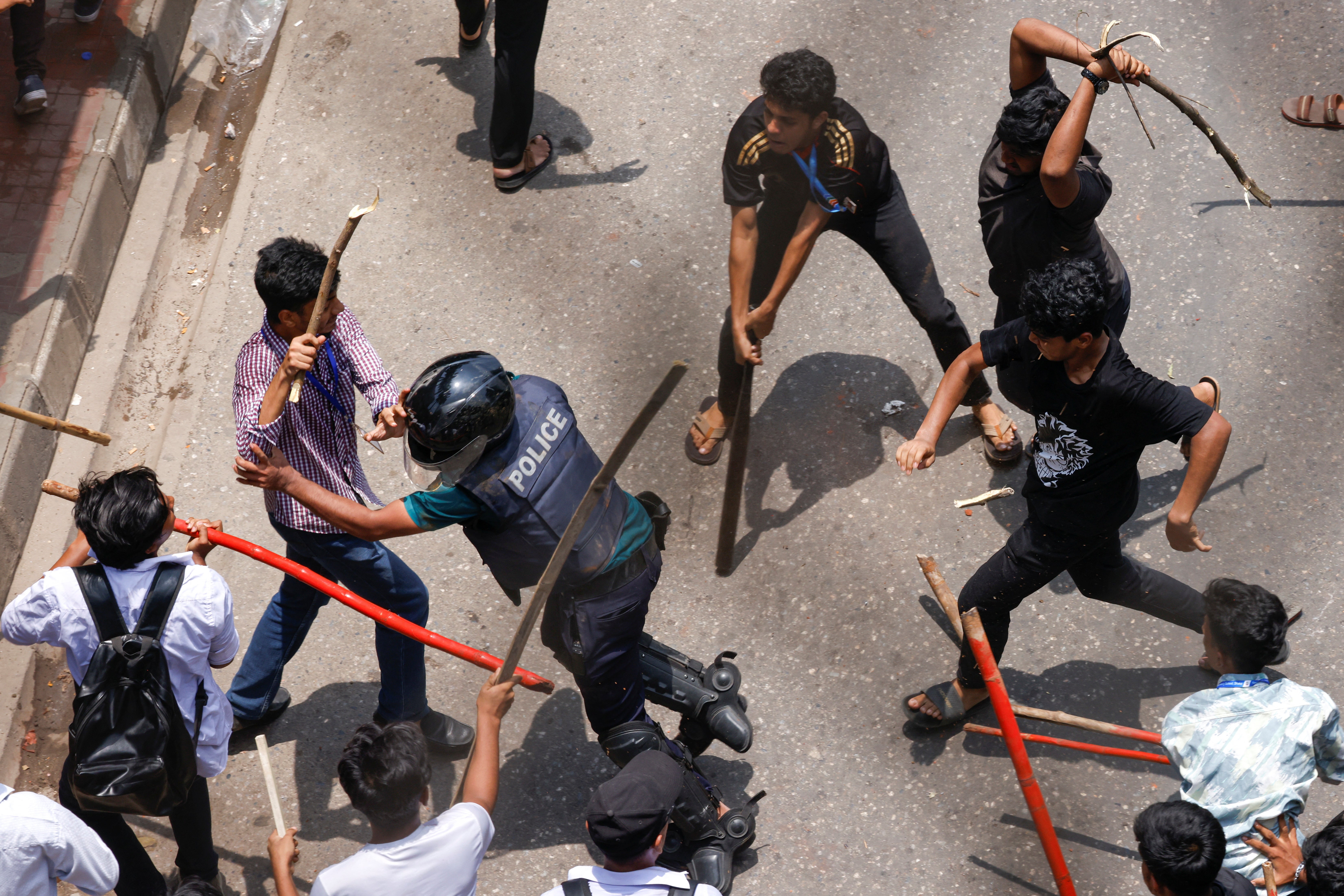
Mobile services were halted across most of the country while internet services were cut for the first time since 2021, according to cybersecurity company Surfshark. The last time Bangladesh witnessed internet restrictions were during the protests over Indian prime minister Narendra Modi's visit to the neighbouring country.
The US embassy in Dhaka said it would close on Thursday and advised its citizens to avoid demonstrations and large gatherings.
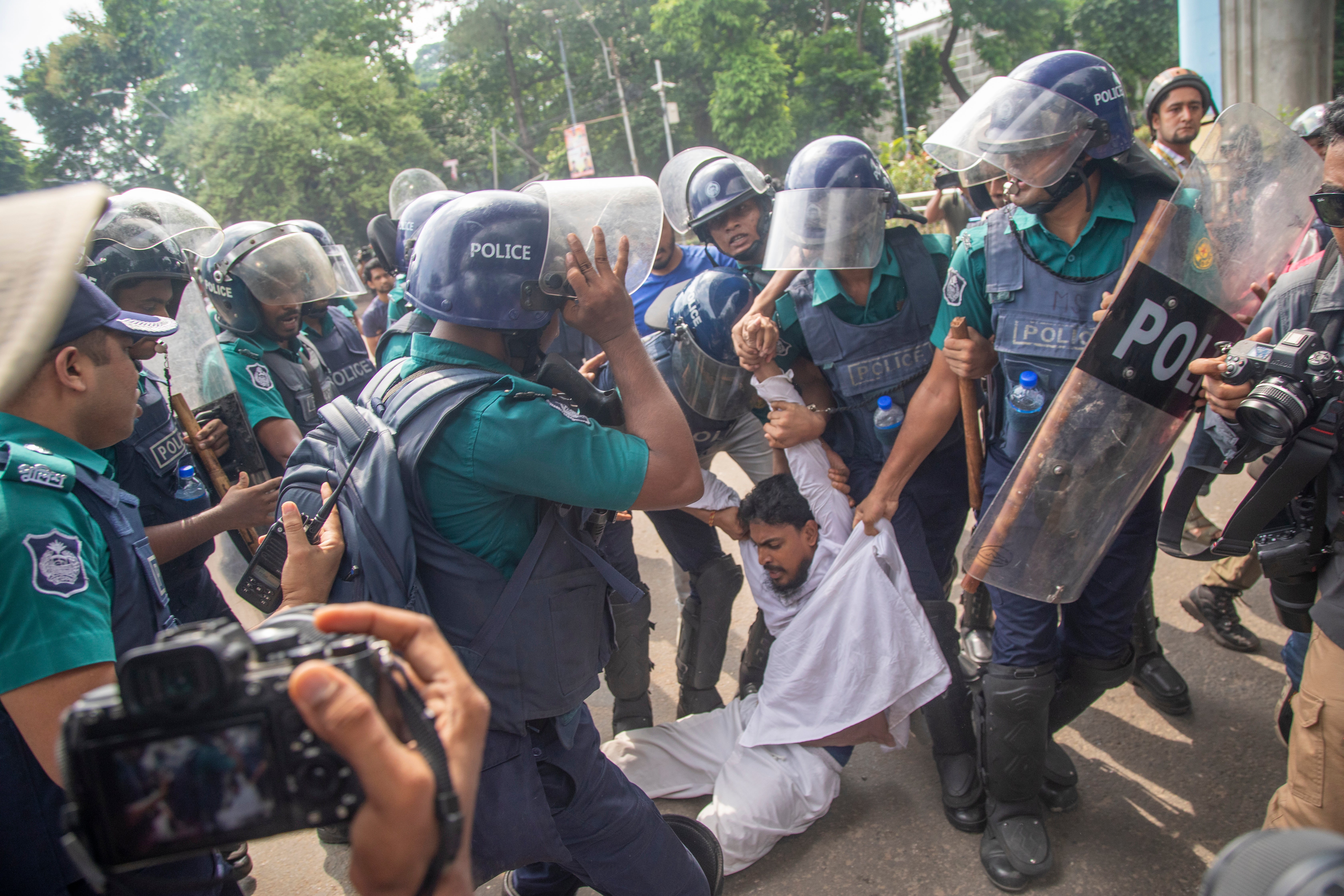
A US State Department spokesperson earlier this week condemned the violence against peaceful protesters. "The freedom of expression and peaceful assembly are essential building blocks of any thriving democracy ... Our thoughts are with those who have been impacted by this violence," Mathew Miller said.
On Wednesday the protests led to traffic halts on a major road as police fired tear gas and rubber bullets at protesters, who set fire to a toll booth, blocked streets and detonated explosives, Somoy TV reported.
The protesters announced they would enforce "a complete shutdown" across the country on Thursday in response to security officials' continued attacks on the campus demonstrators. The main opposition Bangladesh Nationalist Party (BNP) said that it would do what it could to make the shutdown a success.
The Bangladesh government on Tuesday shut all public and private universities indefinitely and sent riot police and the Border Guard paramilitary force to university campuses to keep order.
Ms Hasina is the daughter of Sheikh Mujibur Rahman, the man who led Bangladesh to independence. She has so far refused the protesters' demands but promised her government would set up a judicial panel to investigate the deaths after police fired bullets and tear gas to scatter protesters.
Her law minister, Anisul Huq, said the government was willing to talk to the protesters "whenever they want to sit in the discussion, it will happen".
The protests are the first major challenge to Ms Hasina since she secured a fourth consecutive term early this year in an election boycotted by the opposition parties.
The quota system was suspended in 2018, ending similar protests against it. However, a High Court last month asked for the 30 per cent quota for descendants of freedom fighters to be restored.
The Supreme Court last week stayed the High Court’s order for four weeks and the country’s chief justice asked the student protesters to return to their classes.
“Bangladeshi authorities must fully respect people’s right to freedom of peaceful assembly in line with its commitments under international law and its own Constitution and protect peaceful protesters from further harm," said Taqbir Huda, regional researcher for South Asia at Amnesty International.
Bangladesh cuts mobile internet as student protests over jobs intensify
Police fire tear gas at students in Dhaka who are demonstrating against civil service hiring rules they call discriminatory.








Police fire tear gas to disperse students protesting against quotas in government jobs at Dhaka University. [Zabed Hasnain Chowdhury/NurPhoto via Getty Images]
Published On 18 Jul 2024
Bangladesh has suspended some mobile internet services, with police firing tear gas at student protesters as violent clashes over civil service hiring quotas continue to rock the country.
The nationwide protests, which have killed at least nine people and injured more than 500 this week, showed no signs of abating on Thursday, with authorities blocking mobile services across most of the South Asian country.
Zunaid Ahmed Palak, the junior information technology minister, said mobile internet had been “temporarily suspended” owing to “various rumours” and the “unstable situation created” on social media.
Services would be restored once the situation returned to normal, he added. Two days earlier, internet providers had cut off access to Facebook – the protesters’ key organising tool.
On Thursday morning, police fired tear gas canisters at students near BRAC University in the capital, Dhaka. Tear gas was also deployed against stone-throwing students who blocked a main highway in the southern port city of Chittagong.
“The situation is still volatile and restless,” said Al Jazeera’s Tanvir Chowdhury, reporting from Dhaka. “We know the protests are spreading in different parts of the city and … I’ve got reports of protests in other parts of the country.”
The unrest continued after students called for a nationwide shutdown on Wednesday evening, with the support of the opposition Bangladesh Nationalist Party (BNP), whose headquarters have been raided by police.
Shops and offices were open in Dhaka but there were fewer buses on the streets as the students’ shutdown call appeared to draw a limited response.
‘We sought rights’: Bangladesh on edge after quota protest turns violent

Bangladesh protests: Local media reports 17 people killed

Bangladesh job quota protesters call for nationwide shutdown
Rigged system?
Students have been demonstrating for weeks against a quota system for government jobs that they say favours supporters of Prime Minister Sheikh Hasina’s Awami League party, which led the country’s independence movement.
Under the system, a third of jobs are reserved for family members of veterans who fought for the country’s independence from Pakistan in 1971.
Angered by high youth unemployment, with nearly 32 million people – almost one-fifth of the total population of 170 million – out of work or education, students are pressing for a system based on merit.
The protests escalated after violence broke out on the campus of Dhaka University on Monday, with protesting students violently clashing with police and the student wing of Awami League.
Six people were killed amid protests on Tuesday, leading the government to shut all public and private universities indefinitely from Wednesday and send riot police and the Border Guard paramilitary force to campuses.t
The violence continued late on Wednesday in Dhaka, with Al Jazeera’s Chowdhury reporting that students were “stuck” on campus at Dhaka University and Jahangirnagar University.
“Police used rubber bullets, shotguns, tear gas and were even followed sometimes by pro-government student-wing members who attacked the students,” he said.
Police confirmed on Thursday that an 18-year-old had been “hit by rubber bullets” and died before being admitted to hospital.
Two more students were killed on Thursday after clashes in Uttara, a middle-class neighbourhood in Dhaka’s north, according to Merina Parvin, a nurse at Uttara Adhunik Medical College hospital, where more than 100 students are being treated, the AFP news agency reported.
The protests are the first significant challenge to Hasina’s government since she won a fourth straight term in January in an election boycotted by the opposition.
In a speech on Wednesday, Hasina promised her government would set up a judicial panel to investigate the deaths, promising that those responsible would be brought to justice.
The government halted the quotas after mass student protests in 2018. But last month, the High Court nullified that decision and reinstated the quotas after relatives of the 1971 veterans filed petitions.
Hasina asked the students to be patient until the Supreme Court issues a verdict next month on the government’s appeal against the High Court ruling.
“I am requesting all to wait with patience until the verdict is delivered,” Hasina said in a televised address on Wednesday evening.
“That doesn’t seem to have convinced the students much,” said Al Jazeera’s Chowdhury. “It’s unprecedented using that kind of police force against students.”

On Thursday, Law Minister Anisul Huq said the government was willing to talk to the protesters.
“We are willing to sit [with them]. Whenever they want to sit in the discussion, it will happen,” he said.
The United States embassy in Dhaka said it would close on Thursday and advised its citizens to avoid demonstrations and large gatherings. The Indian embassy issued a similar advisory.
Rights groups, such as Amnesty International, as well as the United Nations and the US, have urged Bangladesh to protect peaceful protesters from violence.
July 18, 2024
By Reuters
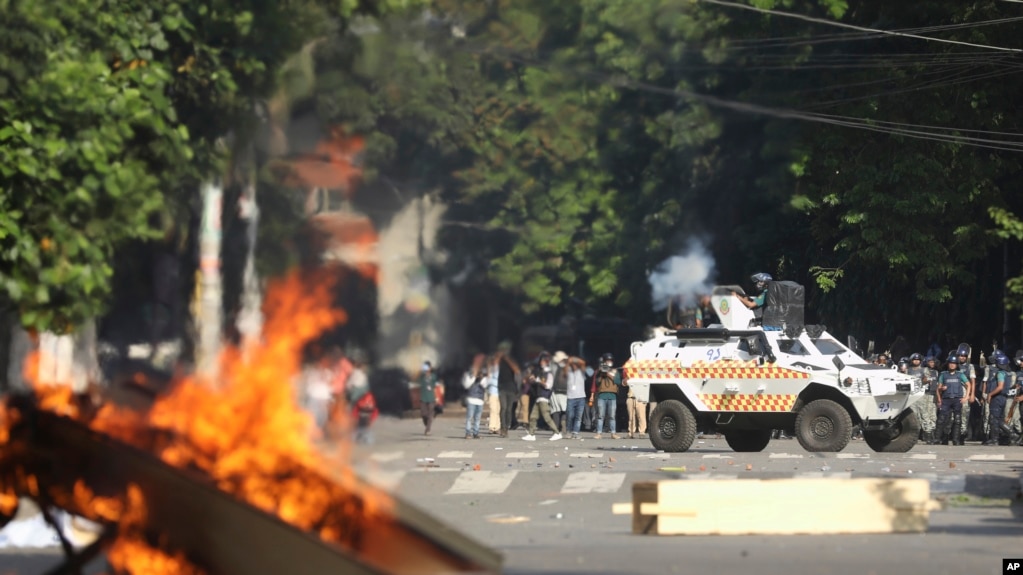
Thousands of students armed with sticks and rocks clashed with armed police in Dhaka on Thursday as the Bangladesh authorities cut some mobile internet services to quell anti-quota protests that have killed at least 12 people this week.
The nationwide protests are the biggest since Prime Minister Sheikh Hasina was re-elected to a fourth term in office, and are fueled by high unemployment among the youth, with nearly a fifth of the 170 million population out of work or education.
Six people died in clashes with police in Dhaka on Thursday, including a bus driver whose body was brought to a hospital with a bullet wound to his chest, and a student, officials told Reuters. Hundreds more were injured, they said.
Law Minister Anisul Huq said the government was willing to talk to the protesters, who want the state to stop setting aside 30% of government jobs for the families of those who fought in the 1971 war of independence from Pakistan.
Hasina, the daughter of Sheikh Mujibur Rahman, who led Bangladesh to independence, has so far rejected the protesters' demands.
"We are willing to sit (and talk with them). Whenever they want to sit in the discussion, it will happen," Huq said.
Earlier, police fired tear gas to scatter protesters near a Dhaka university campus and authorities cut some mobile internet services in a bid to limit the demonstrations.
Police also fired tear gas to disperse stone-throwing students who blocked a highway in the southern port city of Chittagong.
The U.S. Embassy in Dhaka said it would close on Thursday and advised its citizens to avoid demonstrations and large gatherings. The Indian embassy also issued a similar advisory.
Authorities had shut all public and private universities indefinitely from Wednesday and sent riot police and the Border Guard paramilitary force to university campuses to keep order.
On August 7, the Supreme Court is due hear the government's appeal against a High Court verdict that ordered the reinstatement of the quota. Hasina has asked the students to be patient until the verdict.
Rights groups, such as Amnesty International, as well as the United Nations and the United States, have urged Bangladesh to protect peaceful protesters from violence.
How Razakars of 1971 have returned to haunt Bangladesh amid quota protests
'Tui ke? Ami ke? Razakar, Razakar!' The slogan rang amid others as students marched on the campus of Dhaka University. The anti-quota protesters were triggered by a remark by Bangladesh PM Sheikh Hasina that referred to Razakars. Who were the Razakars, and why do they still play a role in Bangladesh politics?

Bangladeshi freedom fighters with a captured informer Razakar, after the Indian Army liberated Jessore of East Pakistan (now Bangladesh). (Photo: Michael Brennan/Getty Images)
Sushim Mukul
New Delhi,
"Tui ke? Ami ke? Razakar, razakar! Ke boleche, ke boleche, sairachar- sairachar." The slogan that translates to 'Who are you? Who am I? Razakar, Razakar! Who says that, who says that, dictator, dictator!' echoed on the streets of Dhaka as students from several colleges flooded them to protest against job quotas. Bangladesh is in the grips of a massive students' protest, which has prompted countries, including India, to issue travel advisories.
The agitation against civil service quotas for descendants of freedom fighters intensified and turned violent, resulting in at least six deaths. Schools and colleges have been shut down, and mobile internet and transportation services were suspended as students clashed with security personnel across major cities.
The protests and the slogans referring to Razakars didn't emerge out of the blue.
SHEIKH HASINA QUESTIONS PROTESTERS ON RAZAKARS
While there had been debates and protests in Bangladesh centred around a quota system in its civil services where 30% of the seats had been reserved for children of freedom fighters or the mukti joddaa, before 2018, a statement by Prime Minister Sheikh Hasina with a Razakar reference acted as additional fuel for the agitation fire.
"Are the children and grandchildren of freedom fighters not talented? Are only the children and grandchildren of Razakars [collaborators with Pakistan in 1971] talented? Why do they have so much resentment towards freedom fighters? If the grandchildren of the freedom fighters don't get quota benefits, should the grandchildren of Razakars get the benefit?," said Bangladesh Prime Minister Sheikh Hasina a few days ago.
While Hasina's remark, which stirred memories from the 1971 Liberation War, also fuelled protesters who called the statement "disparaging". They alleged preferential treatment for the descendants of freedom fighters at the expense of merit.

Students advocating for quota reform in public service held a mock funeral at Dhaka University in memory of those who died during clashes, in Dhaka, Bangladesh. (AP Photo/Rajib Dhar)
Hasina's reference to Razakars, according to the protesting students, was to associate them with "the collaborators with Pakistan in 1971".
Interestingly, the Supreme Court recently suspended the High Court's order that upheld the quota reserving 30% civil service seats for the descendants of freedom fighters.
However, Hasina's statement was not the lone Razakar reference. Following the Prime Minister, her party members fanned the anguish among the protesting students by making similar statements, according to Dhaka-based newspaper The Daily Star.
"Razakars have no right to hold the blood-stained red and green flag of the Liberation War martyrs", said Dipu Moni, the Social Welfare Minister.
"No demands will be accepted from those who want to become Razakars," said Mohammad Ali Arafat, the State Minister of Information and Broadcasting.
THE POLITICS OF QUOTA PROTEST IN BANGLADESH
As in numerous protests and movements around the world, the one in Bangladesh over quotas for the descendants of freedom fighters, too, started as an apolitical one. While the friends of the ruling dispensation claim the protests not to be an organic reaction of students, it has not been devoid of political colours.
While the Sheikh Hasina-led ruling party Awami League and its student wing, the Bangladesh Chhatra League, actively tried to repress the movement, the opposition parties, including the Khaleda Zia-led Bangladesh Nationalist Party (BNP) and its student wing publicly sided with the protesting students, according to Mubashar Hasan, a Bangladesh expert and post-doctoral researcher at University of Oslo, Norway.
"The protests have been largely peaceful but the ruling party student wing with the support of other ruling party wings and police came down heavily on the protestors," Mubashar Hasan tells IndiaToday.In.
"The opposition is trying to expand its popular base by aligning with popular demands like the quota movement," he explains.
Hasina, who won the Bangladesh general polls earlier this year, experts hint that she has been ruling with an iron fist. The January election was boycotted by the BNP. It is possible that the protests aren't just about job quotas, and an expression of frustration over the Hasina-led Awami League government. Hasina has become the Prime Minister for the fourth consecutive term amid allegations of massive electoral rigging.
Oslo-based Mubashar Hasan believes that the protests, where Hasina is labelled a "dictator", also indicate doubts about her election engineering.
"Hasina's government was thriving in disseminating fear in society. Now, it seems that fear has gone away, and as a result it is plausible to argue that there is growing and explicit criticism of Hasina's leadership and, by publicly calling her dictator through slogans, it is evident that students are questioning her election engineering too," Mubashar Hasan tells India Today.In.
There are artworks, memes, rap songs, and slogans circulating on social media calling Sheikh Hasina a dictator. It was unthinkable previously, according to Hasan.
To paint all the protesting students as Razakar was clearly not taken kindly, and in turn, ignited the slogan, "Tui ke? Ami ke? Razakar, Razakar! Ke boleche, ke boleche, sairachar- sairachar". A clear attack on Hasina and her name-calling.
ROLE OF RAZAKAR IN 1971 LIBERATION WAR OF BANGLADESH
The Razakar reference, which has long been a symbol of treachery and betrayal in the eyes of pro-Liberation Bangladeshis, thus hurt the sentiments of the protesting students.
During the 1971 Bangladesh Liberation War, the Razakars, a locally recruited paramilitary force by General Tikka Khan, who is infamous as 'The Butcher of Bengal'. The Razakars betrayed the Bengalis fighting for their independence by collaborating with the Pakistani army and committing brutal atrocities. Composed of mostly pro-Pakistani Bengalis and Biharis, they assisted the Pakistani military in raids, mass rapes and killings, and torture and arson.
The Razakars, along with other radical religious militias like Al-Badr and Al-Shams, became the face of brutal action, and targeted civilians, students, intellectuals, and religious minorities, who raised their voices against the Pakistani occupation and exploitation of Bangladesh.
The Al-Badr and Al-Shams were raised to counter the Mukti Bahini, the guerrilla resistance movement, backed by the Indian Army.
This betrayal by the Razakars led to the deaths of 3 million Bengalis and the rape of up to 4 million women, making them synonymous with treachery in Bangladesh and those who opposed its liberation.
Prime Minister Sheikh Hasina's Razakar remark, endorsed by party leaders, touched a raw nerve and added fuel to the quota agitation fire. In a country where most issues have a 1971 link, Razakar is that part of history not many want to be associated with. And after 50 years, the Razakars are back to haunt Bangladesh.

Anti-quota supporters clash with police and Awami League supporters at the Rampura area in Dhaka, Bangladesh, July 18, 2024.
By Ruma Paul
DHAKA (Reuters) -Thousands of students armed with sticks and rocks clashed with armed police in Dhaka on Thursday, as the Bangladesh authorities cut some mobile internet services to quell anti-quota protests that have killed at least 10 people this week.

A police officer is beaten by mob during a clash between anti-quota supporters, police and Awami League supporters at the Rampura area in Dhaka, Bangladesh, July 18, 2024. REUTERS/Mohammad Ponir Hossain© Thomson Reuters
The nationwide protests are the biggest since Prime Minister Sheikh Hasina was re-elected to a fourth term in office, and are fuelled by high unemployment among the youth, with nearly a fifth of the 170 million population out of work or education.
Four people died in clashes with police in Dhaka on Thursday, the Daily Star newspaper said citing Mizanur Rahman, superintendent of a city hospital. Hundreds more have been injured.
Law Minister Anisul Huq said the government was willing to talk to the protesters, who want the state to stop setting aside 30% of government jobs for the families of those who fought in the 1971 war of independence from Pakistan.

People run as police fire teargas during a coffin rally of anti-quota protesters at the University of Dhaka, a day after the clash with Bangladesh Chhatra League, the student wing of the ruling party Bangladesh Awami League, and anti-quota protesters, in Dhaka, Bangladesh, July 17, 2024. REUTERS/Mohammad Ponir Hossain© Thomson Reuters
Hasina, the daughter of Sheikh Mujibur Rahman, who led Bangladesh to independence, has so far refused the protesters' demands.

People run as police fire teargas during a coffin rally of anti-quota protesters at the University of Dhaka, a day after the clash with Bangladesh Chhatra League, the student wing of the ruling party Bangladesh Awami League, and anti-quota protesters, in Dhaka, Bangladesh, July 17, 2024. REUTERS/Mohammad Ponir Hossain© Thomson Reuters
"We are willing to sit (and talk with them). Whenever they want to sit in the discussion, it will happen," Huq said.
Earlier, police fired tear gas to scatter protesters near a Dhaka university campus and authorities cut some mobile internet services in a bid to limit the demonstrations.
Police also fired tear gas to disperse stone-throwing students who blocked a major highway in the southern port city of Chittagong.
The U.S. embassy in Dhaka said it would close on Thursday and advised its citizens to avoid demonstrations and large gatherings. The Indian embassy also issued a similar advisory.
Authorities had shut all public and private universities indefinitely from Wednesday and sent riot police and the Border Guard paramilitary force to university campuses to keep order.
On August 7, the Supreme Court is due hear the government's appeal against a High Court verdict that ordered the reinstatement of the quota. Hasina has asked the students to be patient until the verdict.

People run as police fire teargas during a coffin rally of anti-quota protesters at the University of Dhaka, a day after the clash with Bangladesh Chhatra League, the student wing of the ruling party Bangladesh Awami League and anti-quota protesters, in Dhaka, Bangladesh, July 17, 2024. REUTERS/Mohammad Ponir Hossain© Thomson Reuters
Rights groups, such as Amnesty International, as well as the United Nations and the United States, have urged Bangladesh to protect peaceful protesters from violence.
(Reporting by Ruma Paul; Editing by Shilpa Jamkhandikar and Clarence Fernandez and Miral Fahmy)
QUOTA REFORM MOVEMENT: VIOLENCE GRIPS BANGLADESH, GOVT READY TO TALK
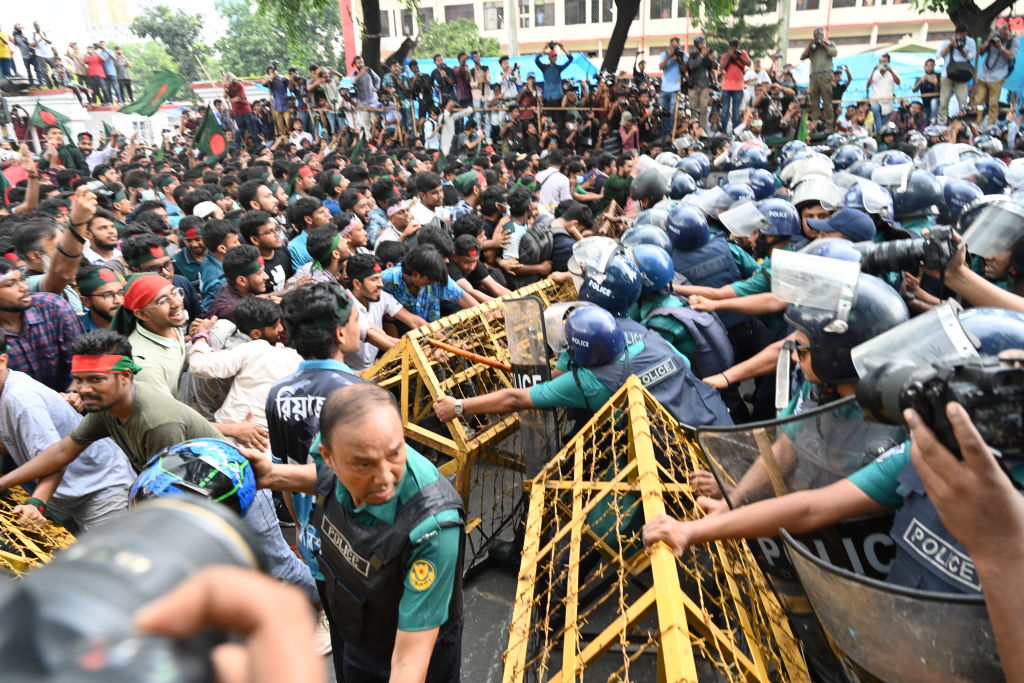
In Bangladesh, at least four killed and hundreds injured in clashes between quota reform protesters and the police on Thursday during nationwide shutdown. The protesters on Wednesday called for a complete shutdown across the country to push home their demand to reform the quota system and protests the attacks on student protesters.
The protesters demonstrating against the government’s handling of the ongoing quota reform movement blocked major national highways, snapped Dhaka’s rail communication with the rest of the country and also paralysed metro rail operations in Dhaka.
Meanwhile, the Law, Justice, and Parliamentary Affairs Minister of Bangladesh Anisul Huq said that the government agrees in principle on quota reform and is ready to hold talks with the quota reform protesters, reports Bangladesh Sangbad Sangstha (BSS). “The Prime Minister has given me and Education Minister Mohibul Hasan Chowdhury the responsibility to hold talks with them. We want to have talks with them whenever they want, if they want to hold talks today, we are ready to do this,” the law minister said while briefing the media in Dhaka.
In view of the ongoing situation in Bangladesh, the Indian High Commission in Dhaka on Thursday issued an advisory for the Indian community members and the Indian students residing in Bangladesh to avoid local travel and minimize their movement outside their living premises.
To maintain law and order situation, the government has deployed 229 platoons of Border Guard Bangladesh (BGB) in addition to various police agencies across the country.
The universities Students and teachers have been staging protests demanding quota reforms in government jobs since July 1. Six people were killed and scores were injured on Tuesday as students’ protests against the job quota across the country turned deadly amid alleged attacks by police and ruling party affiliated student organisations on protesters.
The protests started in response to a verdict by the High Court on 5 June 2024, which declared the 2018 government circular cancelling the 30% quota for freedom fighters’ descendants in government jobs, illegal. The circular was issued in the wake of the 2018 Bangladesh quota reform movement.
Meanwhile, the United Nations has urged the Bangladesh government to protect the protesting students demanding quota reforms in the government jobs against any form of threat or violence.
Stéphane Dujarric, spokesman for the secretary-general, at Tuesday noon briefing in New York said that the UN was very much aware of the situation, which they were following closely and with concern.
The University Grants Commission of Bangladesh on Tuesday night said all public and private universities, its affiliated medical colleges and other institutions, will remain closed until further notice for the sake of students’ safety. The Education Ministry also announced on Tuesday the closure of all secondary and higher secondary educational institutions including polytechnic institutes until further notice.
After the independence of Bangladesh, 30 percent of the jobs were reserved for freedom fighters. In 1997, the government extended the quota to children of freedom fighters. In 2010, it was further expanded to include the grandchildren of freedom fighters.
In 2018, following nationwide protests against this quota system, a government circular cancelled the quota system for first- and second-class jobs. However, on June 5, 2024, the High Court ruled on a writ petition filed by the descendant of a freedom fighter and six others. The HC said the 2018 circular was illegal, meaning quotas were re-established in government recruitment once more. The government has appealed this ruling.
By: Navalsang Parmar (Dhaka)

By Julhas Alam - Associated Press - Wednesday, July 17, 2024
DHAKA, Bangladesh — Several major universities in Bangladesh shut their doors Wednesday or promised to, after at least six people died in violent campus protests over the allocation of government jobs and police raided the headquarters of the main opposition party.
After two days of clashes, the University Grants Commission urged all public and private universities to shut until further notice, and about a dozen major public universities said they would, according to officials and media reports.
Among them was Dhaka University, which is at the center of the violence and decided to suspend classes and close its dormitories indefinitely, a university official told The Associated Press, speaking on condition of anonymity because he was not authorized to speak to media. Wednesday was a public holiday in Bangladesh and the number of closures would become clearer on Thursday.
Protesters are demanding an end to a quota system that reserves up to 30% of government jobs for family members of veterans who fought in Bangladesh’s war of independence in 1971.
They argue the system is discriminatory and benefits supporters of Prime Minister Sheikh Hasina, whose Awami League party led the independence movement, and want it replaced with a merit-based one.
Quotas were halted by a court order after mass student protests in 2018. But last month, Bangladesh’s High Court nullified that decision, reinstating the system and triggering new demonstrations last month. While that court order has since been suspended, the protests have continued and turned violent this week.
The clashes come months after Hasina maintained power in an election that was boycotted by opposition parties and saw opposition members jailed ahead of the polls.
Authorities said that at least six people were killed on Tuesday in violence across the country as student protesters clashed with pro-government student activists and with police. Violence was reported around the capital, Dhaka, the southeastern city of Chattogram and the northern city of Rangpur.
There were new clashes on Wednesday.
Bangladesh’s ruling party blamed the main opposition Bangladesh Nationalist Party for the chaos, and Dhaka police raided the party’s headquarters overnight.
Detective chief Harun-or-Rashid told reporters that police had arrested seven members of the party’s student wing in connection with two buses that were set on fire Tuesday. He added that detectives found 100 crude bombs, 500 wooden and bamboo sticks, and five to six bottles of gasoline in the raid.
Ruhul Kabir Rizvi, a senior BNP leader, accused the government of “staging” the raid to divert attention from protests.
On Wednesday, police clashed with BNP supporters in Dhaka after a funeral for the six people who died a day earlier.
Police official Sentu Mia said they used rubber bullets to disperse the opposition activists after they attacked police, and several opposition activists were arrested.
BNP Secretary-General Mirza Fakhrul Islam Alamgir accused police of barring their supporters from the funeral prayers.
Stray protests also took place at Dhaka University and elsewhere in the country. Police were deployed to the campus, while paramilitary border forces patrolled the streets of the capital and other big cities.
A senior leader of the ruling Awami League party said the opposition was using the protests as a weapon against Hasina. Obaidul Quader, the Awami League’s general secretary and a senior Cabinet minister, said that “evil forces” have taken over the student movement, blaming the student wings of the BNP and rightist Jamaat-e-Islami party for Tuesday’s violence.
He urged the protesters to have patience until the country’s Supreme Court hears petitions involving the quota issues next month.
The protests began late last month but turned violent on Monday as protesters at Dhaka University clashed with police and counterprotesters organized by the student wing of the governing Awami League party, leaving 100 people injured.
The quota system also reserves government jobs for women, people with disabilities and members of ethnic minorities, but protesters have only sought to end the quota for families of veterans. Protesters have said they are apolitical.
While job opportunities have expanded in Bangladesh’s private sector, many people prefer government jobs because they are seen as stable and high-paying. Each year, nearly 400,000 graduates compete for 3,000 such jobs in the civil service exam.
Last week, the Supreme Court suspended the order by the High Court that reinstated the quotas, and the chief justice asked students to return to classes. But the protests continued.
Hasina defended the quota system Tuesday, saying that veterans deserve the highest respect for their sacrifice in 1971 regardless of their current political affiliation.
“Abandoning the dream of their own life, leaving behind their families, parents and everything, they joined the war with whatever they had,” she said during an event at her office in Dhaka.
Her Awami League party, under her father Sheikh Mujibur Rahman, led the independence war with the help of India. Rahman was assassinated along with many family members in a military coup in 1975.
Prime Minister Sheikh Hasina announced a judicial probe into six fatalities during anti-quota protests
Faisal Mahmud and SM Najmus Sakib
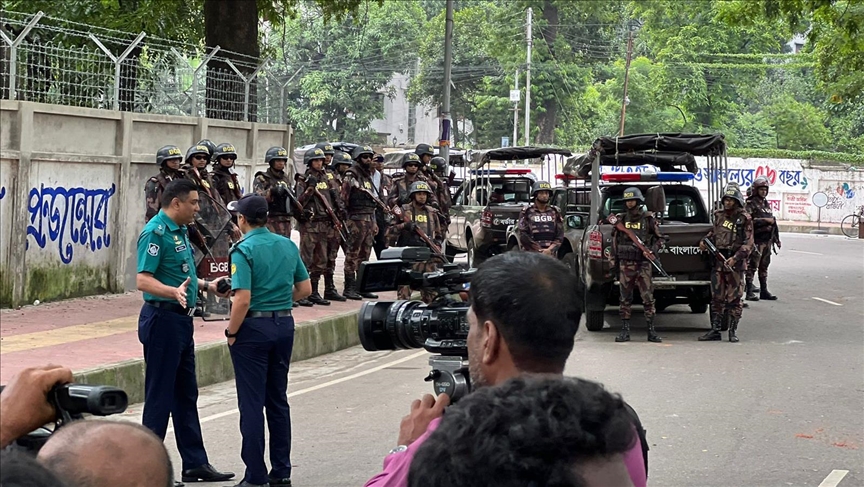
DHAKA, Bangladesh
Student protesters in Bangladesh are refusing to budge from their demand on public jobs reforms amid the complete closure of educational institutions across the country as clashes continued on Wednesday.
The South Asian nation shut all educational institutions after violent protests seeking reforms to jobs quotas resulted in six people dying on Tuesday.
Authorities declared the Dhaka University syndicate closed indefinitely, while the university administration ordered students of 18 residential hostels to vacate by Wednesday evening.
However, students are refusing to vacate campuses, particularly at Dhaka University, the epicenter of the movement, where they have taken positions in various locations, including near the vice chancellor's residence, to pressure him into reversing the closure decision.
Mohammad Mahin Sarkar, a student protester at Dhaka University, told Anadolu: "We won't leave the campus until our demands for quota reform are fully met."
Thousands of students have been demonstrating after a court reinstated quotas for government jobs, which were abolished in 2018.
The system reserves 56% of government job entry positions for certain demographics and classes. Of the current 56% quota, 30% of all jobs in the public sector are reserved for the families of those who participated in the 1971 liberation war.
Students are demanding that quotas for civil service jobs be abolished and given to candidates based on merit.
The Education Ministry on Tuesday night shut down all schools, colleges, madrasas, technical institutions, and polytechnic institutes under its control.
The situation escalated on Wednesday, prompting the University Grants Commission to shut universities.
All public and private universities, along with their affiliated colleges, were closed. To further minimize risk, students were instructed to vacate their dormitories.
Social media giant Facebook is also facing restrictions in the country, according to watchdog NetBlocks.
- Government announces judicial probe
Amid refusal by students to budge on their demands, Bangladeshi Prime Minister Sheikh Hasina instructed a judicial committee late on Wednesday to look into the six fatalities during the protests.
"I am hopeful that the students will receive a fair verdict," said Hasina, referring to a possible High Court ruling on the quota system.
Hasina emphasized that the students were given an opportunity to express their views.
Stressing the importance of resolving disagreements through legal channels, she urged people to refrain from taking to the streets.
"I appeal to all to maintain patience until the verdict is announced," said the prime minister.
Meanwhile, student protesters announced a complete shutdown on Thursday, barring traffic except for ambulances and the opening of public and private offices except hospitals.

Tens of thousands of students joined nationwide protests for a second day after more than 100 people were injured on Monday in rallies that blocked major highways and rail links. Photograph:(Reuters)
STORY HIGHLIGHTS
Bangladesh student protests: The Bangladeshi Police said on Tuesday that at least five people have been killed amid violent protests in the country.
Bangladesh on Tuesday (Jul 16) slammed the United States for making "unsubstantiated" claims about the ongoing student protests in the South Asian country. On Monday, US State Department Spokesperson Matthew Miller expressed concerns about the protests in Bangladesh.
"We are aware of and are monitoring reports of widespread student protests in Dhaka and around Bangladesh that have killed two and attacked and injured hundreds," Miller said.
He added that freedom of expression and peaceful assembly were essential building blocks of any thriving democracy and Washington condemned any violence against peaceful protesters.
Bangladesh responds to US
In a statement, Bangladesh's foreign ministry said, "Use of unverified information to make such baseless claims can fuel violence and undermine Bangladesh government’s efforts to maintain a peaceful environment to allow non-violent protests or movement."
Also read | Setback to Xi Jinping's China? Bangladesh PM Sheikh Hasina cuts short Beijing visit
"Freedom of expression and peaceful assembly are cornerstones of our democracy, and the government remains steadfast to uphold those rights of the citizens while also safeguarding the public property and order," the ministry added and pointed out that violence did not have any place in democracy and politics.
At least five killed amid violent stir
The Bangladeshi Police said on Tuesday that at least five people have been killed amid violent protests in the country. This comes as student protesters have been demanding the removal of the quota system in government jobs. Violence erupted on Monday.
On Tuesday, armed cadres and activists of the ruling Awami League, along with its associated student wings, took to the streets nationwide to counter protesters.
Brandishing sticks, bats, helmets, and even handguns, the cadres labelled the protesters as traitors while confrontations occurred in multiple locations in Dhaka, a report by the news agency Reuters said.
Protests have intensified after Prime Minister Sheikh Hasina refused to meet the students' demands, citing ongoing court proceedings. The protesters are angry over public sector job quotas, including a 30 per cent quota for family members of freedom fighters from the 1971 War of Independence, amid high youth unemployment.
Bangladesh orders closure of schools
The education ministry ordered every high school, Islamic seminary and vocational institute in the country to close indefinitely on Tuesday.
"All high schools, colleges, Islamic seminaries, and polytechnic institutes will be shut down until further order, considering the security of the students," education ministry spokesman M A Khair told the news agency AFP.
(With inputs from agencies)
No comments:
Post a Comment